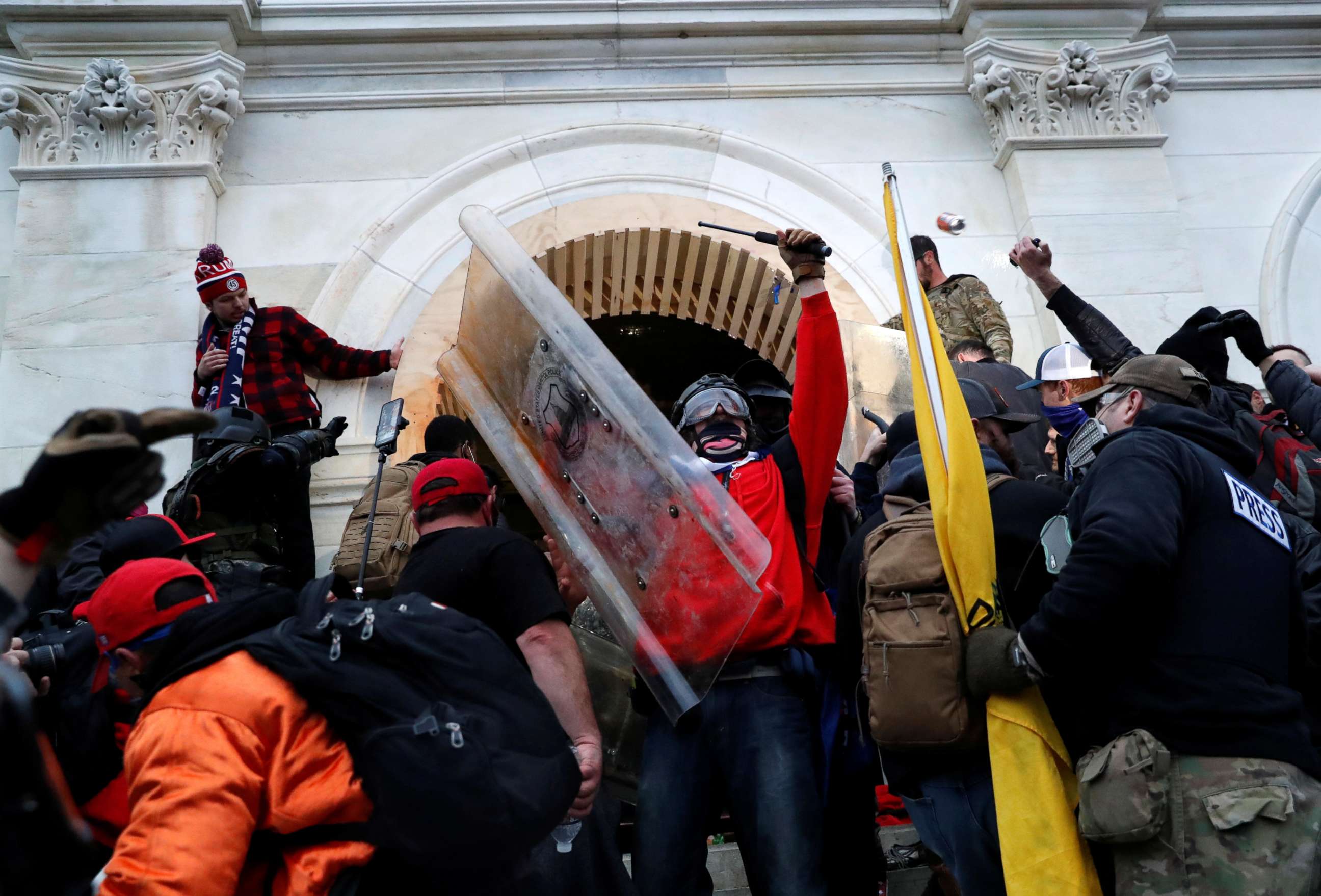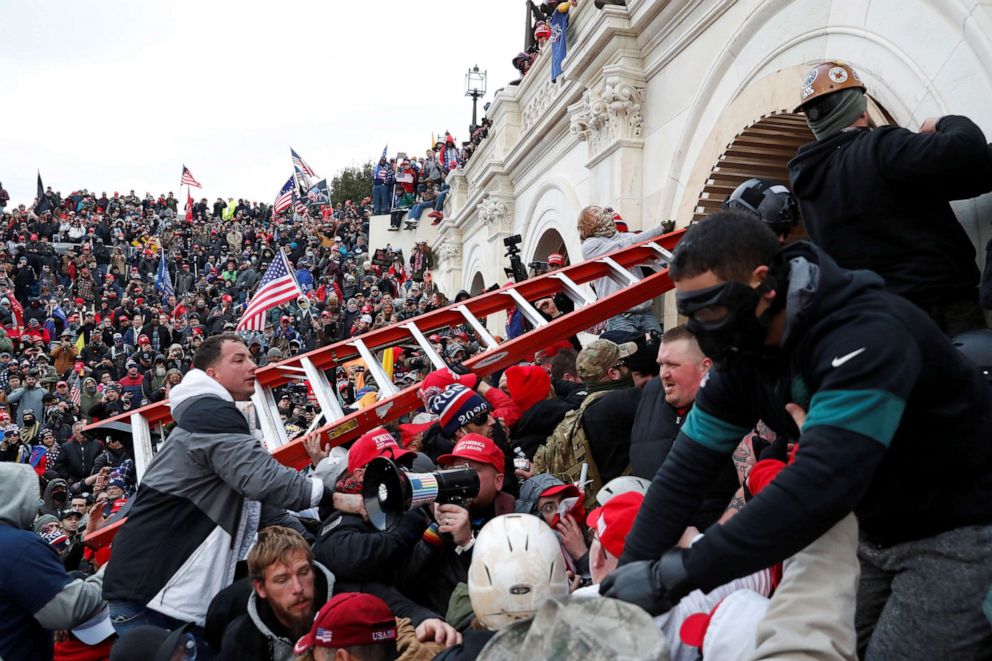Months ahead of Capitol riot, DHS threat assessment group was gutted: Officials
The Homeland Security intelligence branch faced scrutiny over the summer.
In the months leading up to Wednesday's deadly insurrection at the U.S. Capitol, the Trump administration gutted a key federal agency responsible for funneling intelligence and threat assessments to law enforcement partners across the country, two federal officials with direct knowledge told ABC News.
As a result, officials said, the information vacuum left behind may have deprived law enforcement in Washington, D.C., of a key avenue for actionable warnings that could have helped officers prepare for the inbound threat posed by right-wing extremists who gathered on the National Mall on Wednesday.
"Prior to Jan. 6, there were mountains of pre-existing intelligence that should have been collected, analyzed and disseminated to the federal, state and local authorities," one of the officials told ABC News.
One of the officials said that by Monday night, for example, Department of Homeland Security intelligence leaders had received field reports detailing that people known to law enforcement were heading to the Capitol, and that they were heading there in many cases with weapons and ropes.
"Several officials were aware of this intelligence and also assessed violence was likely," said one official.
However, "no specific plans were put in place ahead of time as it would have been done in the past," he said.
Had the DHS Office of Intelligence and Analysis been operating at full capacity over the previous months, the officials said, U.S. Capitol Police would have had a clearer picture of the "specific and credible" threats of violence posed by groups planning to attend Wednesday's rally.
Those threats foreshadowed an unprecedented breach of the Capitol complex on Wednesday, and culminated in the loss of five lives, including a Capitol Police officer deployed to help protect members of Congress as they gathered to formally certify President-elect Joe Biden's Electoral College triumph.
The operations and staffing at DHS' Office of Intelligence and Analysis had been slashed in the wake of controversy surrounding the department's response to civil unrest in Portland, Oregon, over the summer, said the officials, who spoke on the condition of anonymity. The agency came under scrutiny at the time for disseminating reports to law enforcement agencies that included journalists' tweets about documents that were leaked from the department.
As a result, at least two critical intelligence-gathering programs were essentially shuttered, and the office's routine of issuing planning bulletins to police in advance of major public events was all but terminated.

In a statement to ABC News, a DHS intelligence and analysis spokesperson said the agency "has produced numerous intelligence reports highlighting the heightened threat environment during the 2020-2021 election season, including the extent to which the political transition and political polarization are contributing to the mobilization of individuals to commit violence."
"To the extent press reports suggest that [the Office of Intelligence and Analysis] did not believe events such as the certification of the electoral college in effect presented a heightened threat environment, they are incorrect," the spokesperson said.
The spokesperson did not respond to specific questions.
ABC News was only able to identify one DHS intelligence bulletin shared with law enforcement partners in recent weeks warning that the "outcome of the 2020 general election could combine with their enduring political and social views and lead some [domestic violent extremists] to mobilize to violence in the coming months."
That statement was included in a Dec. 30 report entitled "Diverse Domestic Violent Extremist Landscape Probably Will Persist Due to Enduring Grievances." The document did not identify the Jan. 6 joint session of Congress as a potential target, nor did it indicate that Capitol Hill was being targeted.
Also absent was a pre-event bulletin alerting police agencies in the area about discussions being posted online and whether those planning to attend might be looking to act out because of their anger. Such bulletins, though, were published by watchdog groups prior to the event.
Last Monday, for example, the Anti-Defamation League, which monitors extremist groups, issued a news release headlined "Extremists and Mainstream Trump Supporters Plan to Protest Congressional Certification of Biden's Victory."
The release included examples of online comments from people who said they were planning to attend the rally, including one that said that if Congress proceeds to certify Biden's win, "you break into the congress (sic) and kill the swamp creatures. Don't forget your guns, this is not supposed to be a good for nothing peaceful protest, it's the beginning of a revolution."
In response to questions about the limited response Wednesday from the National Guard, which frequently helps with crowd control in Washington and elsewhere, Pentagon officials pointed directly to a lack of intelligence shared with them.

Assistant Defense Secretary Ken Rapuano, who oversees homeland security functions at the Defense Department, told reporters Thursday the overall assessment "that we got repeatedly was no indications of significant violent protests."
In the days since the siege on the Capitol, law enforcement officials have wondered aloud how federal and local authorities failed to foresee and prepare for the threat posed by scores of aggrieved Trump supporters whose anger had been fueled by Trump's repeated insistence that the election was rigged, their votes were changed, and Biden was not the legitimate winner.
Experts said that open-source reporting and publicly available information should have tipped off U.S. Capitol Police, the Metropolitan Police Department, and the FBI that there was a chance of violence on Wednesday -- but that the absence of the official channel of DHS intelligence gathering likely contributed to a lack of situational awareness.
"This entire event was a tactical failure as well as an intelligence failure," said former New York Police Department Chief of Detectives Robert Boyce, an ABC News contributor. Officers at the Capitol were caught "flat-footed," he said, leading to a situation where law enforcement was "overwhelmed and understaffed."
The apparent void of critical intelligence to guide their planning and response left law enforcement at a disadvantage, Boyce explained, so officers were not ready for a mob to surge forward in what was ultimately a successful effort to invade the Capitol complex and storm the building that houses the Senate and House of Representatives.
"Law enforcement should be led by intelligence-driven policing, and to not have that when you're assessing a crowd of that magnitude … it's a really important job," Boyce said.
Collating and disseminating useful intelligence to law enforcement partners is a key function of DHS, an agency created in the wake of the 9/11 attacks in New York and Washington after authorities determined that the attacks were largely failures of intelligence and planning. The agency was formed in part to ensure that law enforcement agencies across the country have top-quality intelligence to assist police in preparing for events like Wednesday's.
"It is DHS' job to assess threats and provide warning to our homeland security partners," said Elizabeth Neumann, a former assistant secretary of Homeland Security under Trump who also worked at the White House in the immediate aftermath of 9/11. "I find it hard to believe, but if, in fact, Capitol Police had no knowledge of the potential threat this crowd posed, then yes, part of the blame can be laid at the feet of DHS."
Another former intelligence official who asked to remain anonymous echoed Neumann's concern that the absence of intelligence on Wednesday reflected a "breakdown in DHS' ability to carry out its core mission."
Instead, the intelligence branch at DHS was overhauled dramatically in recent months, sources said, dating to civil unrest in Portland over the summer. In August, a former DHS intelligence chief, Brian Murphy, was reassigned after reports emerged that his unit had disseminated three reports containing journalists' tweets about documents that were leaked from the department.
When these reports emerged in August, experts said the collection of journalists' tweets for intelligence products threatened to breach Constitutionally protected free speech.
"This seems a misguided use of DHS Office of Intelligence and Analysis resources on a set of priorities from what they should be. It's not clear why they issued these open-source intelligence reports," Javed Ali, who worked on the Trump National Security Council, and in intelligence positions at the FBI and DHS. "I just don't know if that's the way the DHS authorities were designed to be used."
At the time, a DHS spokesperson said the department would "discontinue" collecting information on members of the press.
"In no way does the Acting Secretary condone this practice and he has immediately ordered an inquiry into the matter," a department spokesperson told ABC News.
Murphy's departure led to a restructuring of the intelligence branch of the agency, and sources said that in the months since the Portland controversy, there has been a noticeable drop-off in law enforcement intelligence bulletins -- the contents of which often range from foreign online disinformation to domestic terrorism threat analyses.
In September, DHS faced renewed scrutiny after ABC News reported that its senior leadership withheld publication of an intelligence bulletin warning law enforcement agencies of a Russian scheme to promote "allegations about the poor mental health" of then-candidate Joe Biden.
The bulletin was noteworthy because it said President Trump's campaign rhetoric matched the online messages from Russian-connected websites and social media accounts. Following the news stories, DHS eventually released the document.
One former DHS official anticipated that the agency will be re-booted when the Biden administration takes power later this month.
ABC News' Luke Barr and Luis Martinez contributed to this report.




